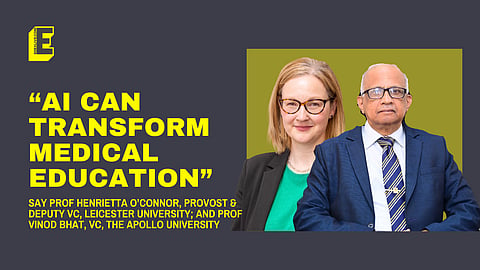
- News
- Campus
- Exam
- Podcast
- Web Stories
- Do You Know
- Path Finders - UG Programs
- Videos
- Book Review

The Apollo University, Chittoor, Andhra Pradesh and the University of Leicester, UK, signed a Memorandum of Understanding (MoU), as a result of which, students will get to pursue two years of Computer Science Artificial Intelligence (AI) and Data Science (DS) course at The Apollo University and their final year at the University of Leicester in the UK.
The MoU signed today gives a lot of hope to students and aspirants who are passionate about these two upcoming fields.
Professor Henrietta O’Connor, Provost and Deputy Vice-Chancellor of the University of Leicester, and Professor Vinod Bhat, Vice-Chancellor of The Apollo University dwell into the details of MoU and speak to us about AI.
Artificial Intelligence (AI) is something that everyone reveres yet fears. Tell us how do you think it will play out for medical education in the coming years?
AI has the potential to revolutionise medical education in the coming years whether this be through virtual reality to create immersive environments where students can interact and learn in safe but lifelike scenarios.
We are already seeing the use of diagnostic assistance tools, helping medical professionals to access data to interpret clinical findings. This can help students make accurate diagnoses and put in place effective treatment plans.
AI also has the potential to personalise learning and assessment, adapting to students’ performance in real-time and giving tailored feedback.
There is the potential to make medical education more accessible, engaging, and effective, ultimately leading to better-trained healthcare professionals and improved patient outcomes but we should note that they cannot reproduce key academic skills such as critical analysis, problem solving or personal reflection required of university level study and we need to ensure a balance so we maximise the benefits while minimising potential risks.
The University (of Leicester) believes that a balanced approach to the use of AI in learning, teaching and assessment is essential and it seeks to provide a supportive and common-sense approach to outlining safe and responsible use of AI.
What else are the aspects of the MoU?
The immediate focus is on the Computer Science AI and DS course, where students will study for two years at The Apollo University (TAU) in Chittoor, Andhra Pradesh and complete their final year at the University of Leicester in the UK.
The MoU further sets out our ambitions to see the establishment of university academic programmes in allied health, healthcare management and health data science, plus and short courses towards the enrichment of knowledge and skills, to enhance students’ employability and preparation to undertake a master’s degree programme.
The partnership will also see us work together to develop a world class research institute of digital health and precision medicine and also see exchange opportunities for faculty staff members and students.
Tell us about two technological developments that will change the face of medical education and healthcare in the coming years.
1) Virtual Reality (VR) to explore anatomical structures, practice surgical procedures, and simulate clinical scenarios in a realistic virtual environment. These technologies offer a safe and cost-effective way to train students, allowing them to gain hands-on experience without the need for expensive equipment or access to real patients.
2) AI is already transforming healthcare by leveraging data analytics, machine learning, and processing to improve diagnosis, treatment, and patient care. In medical education, AI-powered platforms can provide personalised learning experiences, assist students in mastering complex concepts, and offer real-time feedback and assessment.
Some examples of UoL (The University (of Leicester) using AI:
- The university has expertise in the growing area of Artificial Intelligence, in particular, in the field of health.
- In April, it was reported a Leicester study that looked at whether AI can be used to predict whether a person was at risk of a lethal heart rhythm, an AI tool correctly identified the condition 80 per cent of the time.
- In 2023, the university announced it was working on a study which was investigating the use of AI for breast cancer treatment.
